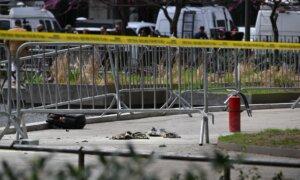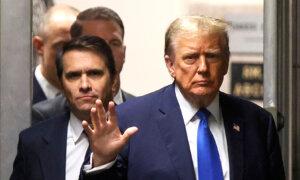Good morning, and welcome to The Epoch Times News Brief for Tuesday, April 23, 2024. I’m Bill Thomas, and today, we’ll dive into former President Donald Trump’s significant $175 million bond agreement, his call for peaceful protests amid the “hush-money” trial, a Supreme Court ruling on Texas voting laws, and its upcoming review of President Joe Biden’s “ghost gun” legislation.
We’ll begin with our first huge story today: some big money, and good news for Donald Trump. President Trump and New York Attorney General Letitia James have reached an agreement on a $175 million bond in his New York civil case, which has been issued by Knight Specialty Insurance Company (KSIC). The bond is meant to secure President Trump’s compliance with a $454.2 million judgment won by Ms. James if he does not succeed in an appeal.
Ms. James claimed that KSIC lacked a “certificate of qualification” and that President Trump could still access the account holding the collateral. But she still approved the agreement, giving the insurance company exclusive control over the account.
President Trump’s legal team accepted the settlement terms, which are structured to guarantee payment if the state wins the appeal.
However, the agreement includes restrictions to ensure the security of the funds.
KSIC is required to provide monthly statements and cannot make changes to the pledge agreement without court approval. The insurance company’s lawyer will serve as the point of contact for any service outside of KSIC.
Ms. James questioned the sufficiency of the bond and the stability of the insurance company. In response, Amit Shah, the president of the insurance company, defended its status, pointing out that it manages a bank account with $175 million in cash set aside for the appeal.
President Trump defended the bond outside the courtroom at his criminal trial, stating that he has supplied the cash and has enough funds to support it.
He said: “We put up cash and the number is 175. She shouldn’t be complaining about the bonding company. The bonding company would be good for it because I put up the money. I have plenty of money to put up.”
The Trump “bond story” is still unfolding, and we’ll keep you updated on the progress of this drama as it continues on.
Now, shifting from legal dealings to public appeals, we share with you President Trump’s requests for peaceful protests as his trial moves forward. As his “hush-money” trial kicked off in New York on Monday, President Trump called on his supporters to “go out and peacefully protest” the case.
On his Truth Social media platform, he questioned why pro-Palestinian demonstrators are allowed to “roam the Cities, scream, shout, sit, block traffic, enter buildings, not get permits, and basically do whatever they want” while pro-Trump backers are “rudely and systematically shut down and ushered off to far away ‘holding areas,’ essentially denying them their Constitutional Rights.”
The former president voiced his criticism of what he perceives as “a two tiered system of justice” that restricts free speech and assembly rights for his supporters. He urged his followers to “GO OUT AND PEACEFULLY PROTEST. RALLY BEHIND MAGA. SAVE OUR COUNTRY!”
He compared leftist pro-Palestinian protests at Columbia University to the restrictions faced by his own supporters.
President Trump wrote on Truth Social on Monday: “Unlike at Columbia University where the Radical Left Palestinian Protesters sat on the Front Lawn, practically took over the School, and screamed, ‘Death to the Jews, Death to Israel, Death to America,’ and nothing happened to them, Lower Manhattan surrounding the Courthouse, where I am heading now, is completely CLOSED DOWN. SO UNFAIR!!!”
He also criticized the trial, saying that it’s also “very unfair” and has prevented him from campaigning in Pennsylvania and Georgia.
The trial, which focuses on a $130,000 payment made to Stormy Daniels during the 2016 election, is expected to last six weeks. President Trump has denied the allegations, labeling the trial as election interference orchestrated by the Biden administration and Democrats.
The jury includes several lawyers, a sales professional, an investment banker, and an English teacher. To convict the former president of a felony, prosecutors must show that he not only falsified business records, but he did so to hide another crime. This New York case is one of four against the former president, and it’s the only one likely to reach trial before the upcoming November election.
We’ll make a move now from protests to policy. The Supreme Court has just ruled on Texas voting laws, which is a significant decision with broad implications. This is something you’re going to be very interested in—let’s take a look. The U.S. Supreme Court has rejected a legal challenge to a Texas law that requires voters under 65 to provide justification for voting by mail.
This means that the attempt by Democrats to expand mail-in voting in Texas has failed because the law only allows individuals 65 and older to vote by mail without a qualifying excuse.
This ruling is viewed as a victory for those who advocate for election integrity, as they believe unrestricted mail-in voting can lead to fraud. It also impacts six other states with similar regulations.
In Texas, public opinion is split on allowing no-excuse mail-in voting. This ruling emerges in the midst of wider debates about election integrity versus voter suppression.
Although there’s a movement toward more lenient voting laws, there’s still some argument for stricter measures, such as requiring photo ID and consolidating election dates, to secure voter integrity.
Here’s another really intriguing story.
President Trump’s increasing support among minority voters has caught the attention of many, as he has gained traction among black and Hispanic voters, potentially changing the traditional voting patterns that have long favored Democrats. Polling data reveals a significant increase in support for President Trump among black men in swing states, rising to 30 percent compared to 11 percent nationally in 2020. Similarly, support among black women has also seen an uptick from 6 percent to 11 percent.
The unexpected erosion of support for Democrats among black voters has left political commentators surprised. Economic factors seem to be a driving force behind this shift, with rising living costs, particularly rent hikes, impacting black and Hispanic communities disproportionately. Additionally, concerns about job security, especially with low-wage illegal immigrants posing a threat to black and Hispanic workers in production and transportation roles, have influenced their support.
President Trump’s efforts to appeal to these voters through initiatives like increasing funding for historically black colleges and universities and expanding the Federal Pell Grant program have resonated with many. Republican leaders advocating for school choice and a return to traditional education policies have also struck a chord with families and voters in these communities.
Moving on to a legal battleground, the Supreme Court’s decision to review the Biden administration’s rule on “ghost guns” has stirred controversy. These homemade firearms without serial numbers pose a challenge for law enforcement, and the rule aims to regulate them by mandating serial numbers and background checks for buyers of gun-assembly kits. The case has seen several reversals and is set for oral arguments in the upcoming fall session.
As we wrap up, we encourage feedback from our listeners to help improve our News Brief program. The show’s growth relies on your support, so spread the word and share the news with your network. Ending on a quote from Oscar Wilde, we remind you to “Be yourself; everyone else is already taken.” Thank you for tuning in to The Epoch Times News Brief, I’m Bill Thomas, wishing you a wildly fabulous day. Please rewrite this sentence.
Source link







